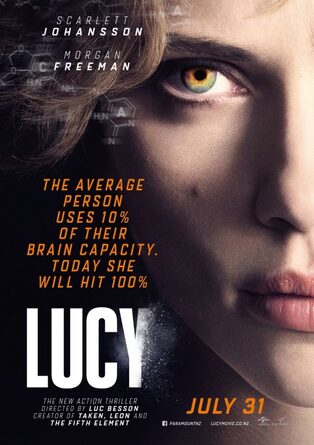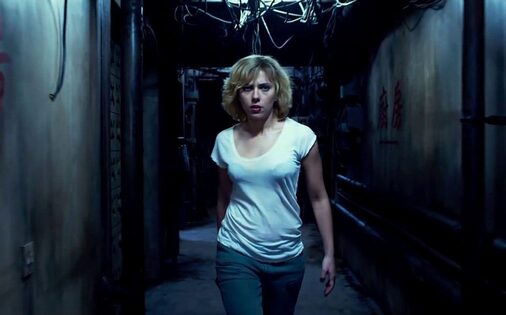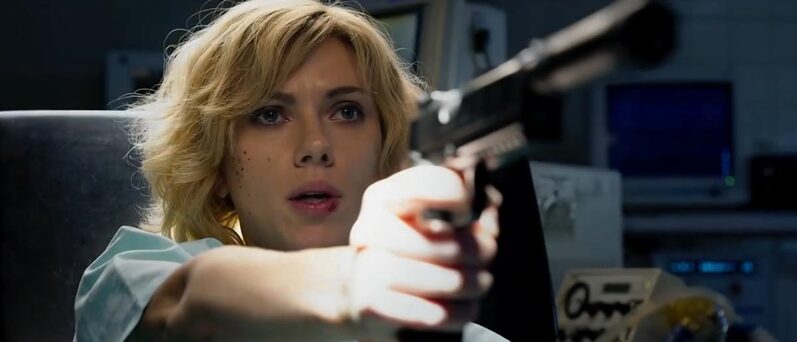 by Dave "The Conduit" Davis
by Dave "The Conduit" Davis
Director: Luc Besson
Starring Scarlett Johansson and Morgan Freeman
There’s a good idea at the heart of Lucy, and some really good concepts. The performances are fine and it’s much more of a “thinking” movie than we’re used to during the summer months, and that’s a good thing.
All that being said, though, the film just doesn’t come together quite enough to be wholly satisfying.
The main beats of the film were served up in the trailer — our heroine, Lucy (Scarlett Johansson), an American abroad in Taiwan, gets roped into a “delivery” deal by her shady boyfriend (never a good idea, by the way), and quickly finds herself in way, way over her head. She finds herself, against her will, in the role of a drug mule for Mr. Jang (Min-sik Choi), who wants her and some other unfortunates to smuggle an experimental synthetic drug, which his organization hopes will be huge in Europe, via baggies surgically implanted in their lower abdomens.
This best-laid plan backfires when one of Jang’s thugs kicks Lucy in the gut for spurning his advances (it looks like that would be the one area the thugs would have been told to avoid kicking, but then we wouldn’t have a movie). A massive amount of the drug is released, and Lucy starts using more and more of her brain’s capacity, which quickly gives her powers over herself, others and the material world.
The film is cast well. After three turns as the Black Widow in the Marvel films, Johansson can certainly play the part of the kick-ass heroine, and Morgan Freeman, as Professor Norman, deliverers the psudeo-science claptrap that underpins the story with the proper authority.
There seems to be two separate plot structures in Lucy, however, and they don’t mesh well together. One is the idea of a human starting to become the ultimate version of herself, peeling back the layers of reality to discover how the universe truly works and, more so, why it works. It’s here where the film is at its best, playing the hard Sci-Fi “what if” game that you don’t get a lot of these days.
Then, there’s the plot where Lucy is being pursued by Jang’s gang. When your main character can make everyone lose consciousness by thinking about it, though, the dramatic tension really isn’t there. The film feels like it almost short circuits itself at this level, and it becomes distracting from the more interesting exploration questions. 
Probably the biggest misstep of the film’s structure is giving Lucy too much, too quickly. From the moment she wakes up from her gut-kicked induced drug overdose, she is otherworldly, displaying powers almost immediately and being removed from her humanity. A more gentle ramp up would have probably given the film’s plot more room to breathe.
Lucy is worth seeing, though. There are ideas played with here that will give you some mental exercise (the idea that humans developed math and science to make the infinite finite proposed by Lucy is interesting), and there are certainly good moments throughout the film. Ultimately, though, it feels like a missed opportunity, and that’s too bad.
Random Observations:
• After seeing Johansson play the aforementioned Black Widow, the thought was in the back of my mind in the beginning of this film, despite myself, that she would start kicking drug-lord ass any second.
• There’s been a lot of talk about the film’s repeated use of the old saw that humans only use 10 percent of their cranial capacity (the director uses title cards telling us how much of her brain Lucy is using during points of the film). It’s a popular myth (who wouldn’t like knowing that they could, if not use 100 percent, be able to bump up their output to, say, 15 percent when the need arises?), but we use pretty much the whole thing all the time. NPR ran a good, quick little segment on this here:

(For more from Dave and the great podcast he co-hosts, go to: http://toweroftechnobabble.com/ )
![]()

